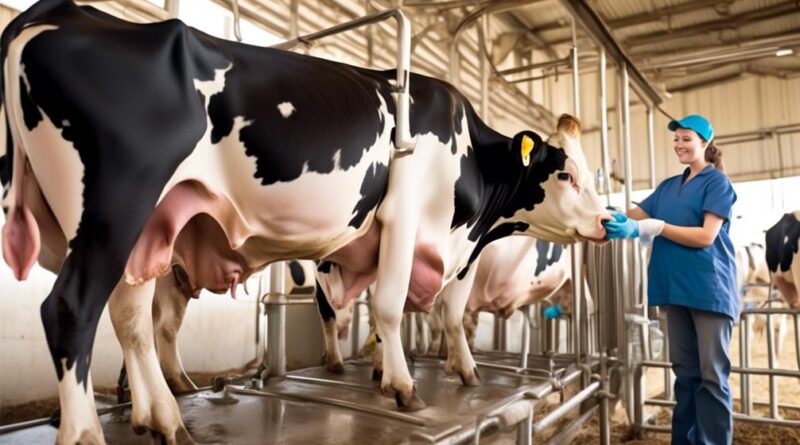Why Is Managing Reproductive Health Important in Dairy Cows?
Ensuring the reproductive health of your dairy cows is not just about maintaining their fertility, but also about optimizing the productivity and profitability of your herd.
As a dairy farmer, you understand the importance of managing the reproductive health of your cows, as it directly impacts your bottom line. But have you considered the broader implications of reproductive health on the overall well-being of your herd and the efficiency of your operations?
There are several key factors to consider when it comes to managing reproductive health in dairy cows, and the impact goes far beyond just ensuring successful pregnancies.
Reproductive Efficiency
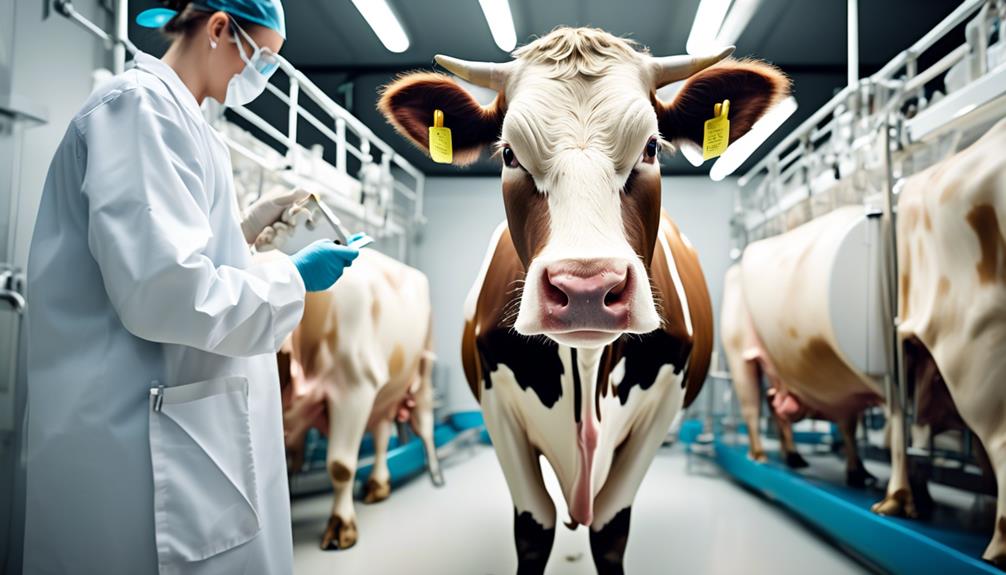
Achieving high reproductive efficiency in dairy cows is crucial for maximizing the profitability of your herd. Fertility management plays a vital role in ensuring that your cows conceive and calve at the right time, ultimately impacting the productivity and economic success of your dairy farm. To effectively manage fertility, understanding hormonal regulation in dairy cows is essential.
Hormonal regulation governs the reproductive cycle in dairy cows. The key hormones involved in this process are estrogen, progesterone, follicle-stimulating hormone (FSH), and luteinizing hormone (LH). These hormones orchestrate the complex series of events leading to ovulation, fertilization, and ultimately, pregnancy. By comprehending the interplay of these hormones, you can strategically intervene to optimize fertility management. For instance, monitoring the levels of these hormones can help you pinpoint the most fertile period for artificial insemination, increasing the likelihood of successful conception.
Effective fertility management also involves closely observing the cows for signs of estrus, or heat, which indicates their readiness to breed. Timely detection of estrus is crucial for successful insemination, and understanding hormonal fluctuations can aid in accurately identifying this period. Additionally, proper hormonal synchronization protocols can be employed to align the reproductive cycles of your cows, streamlining breeding efforts and enhancing overall reproductive efficiency.
Impact on Milk Production
Understanding the hormonal regulation of reproductive cycles in dairy cows significantly influences milk production and overall herd profitability. Hormonal balance plays a crucial role in the reproductive health of dairy cows, which in turn impacts their milk production. The interplay of hormones such as estrogen, progesterone, and gonadotropin-releasing hormone (GnRH) governs the cow's estrous cycle, ultimately affecting the quantity and quality of milk produced.
Hormonal Balance: Proper hormonal balance is essential for the cow to exhibit estrus, conceive, and carry the pregnancy to term. Any disruptions in hormonal levels can lead to irregular estrous cycles, failed conception, or early embryonic loss, ultimately impacting milk production.
Nutrition and Fertility: Adequate nutrition is vital for maintaining the correct hormonal balance in dairy cows. Nutritional deficiencies can disrupt hormonal cycles, leading to decreased fertility and milk production. Ensuring that cows receive a balanced diet rich in energy, protein, vitamins, and minerals is crucial for optimizing reproductive health and milk production.
Management Practices: Effective management practices such as regular health checks, proper housing, and minimizing stress are also essential for maintaining hormonal balance and, consequently, optimal milk production.
Economic Significance
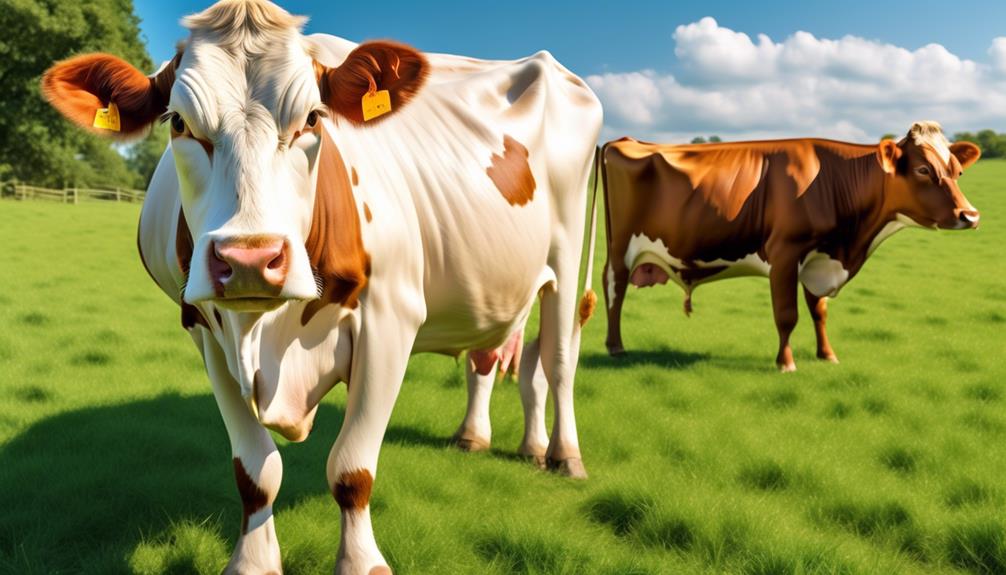
How does the reproductive health of dairy cows impact the economic significance of milk production?
The reproductive health of dairy cows significantly affects the economic significance of milk production through cost analysis and market demand.
When cows experience reproductive health issues, such as extended calving intervals or reduced conception rates, it leads to increased costs for farmers.
These costs include expenses related to veterinary services, medications, and feed, as well as the potential loss of income due to decreased milk production.
Additionally, poor reproductive health directly impacts market demand for dairy products. Consumers expect a consistent and reliable supply of milk, and fluctuations in production due to reproductive issues can lead to supply shortages and fluctuations in market prices.
This can result in financial losses for dairy farmers and the industry as a whole.
Therefore, managing the reproductive health of dairy cows is crucial for maintaining a steady milk supply to meet market demand, ensuring economic stability for dairy farmers, and ultimately, providing consumers with a reliable source of dairy products.
Health and Welfare
The reproductive health of dairy cows has a direct impact on their overall health and welfare, influencing their ability to thrive and contribute to milk production. Maintaining a balance in hormonal levels is crucial for the well-being of dairy cows. Hormonal balance affects their reproductive cycles, metabolism, and overall physiological functions. Genetic selection plays a pivotal role in ensuring the long-term health and welfare of dairy cows.
Selecting for desirable genetic traits not only enhances milk production but also contributes to the overall robustness and resilience of the animals. Proper hormonal balance is essential for dairy cows to maintain regular reproductive cycles and metabolic functions. Imbalances can lead to reproductive disorders and affect the overall health and welfare of the animals. Thoughtful genetic selection can lead to the development of dairy cow breeds that are more resistant to diseases, have better reproductive performance, and exhibit overall improved welfare.
The health and welfare of dairy cows are interconnected with their reproductive health. Ensuring that cows are in good reproductive health contributes to their overall well-being, which in turn positively impacts milk production and the sustainability of dairy farming operations.
Maintaining the health and welfare of dairy cows through managing their reproductive health is vital for ensuring their long-term productivity and quality of life. By focusing on hormonal balance and genetic selection, dairy farmers can contribute to the well-being of their animals while also enhancing the sustainability of their operations.
Breeding Programs
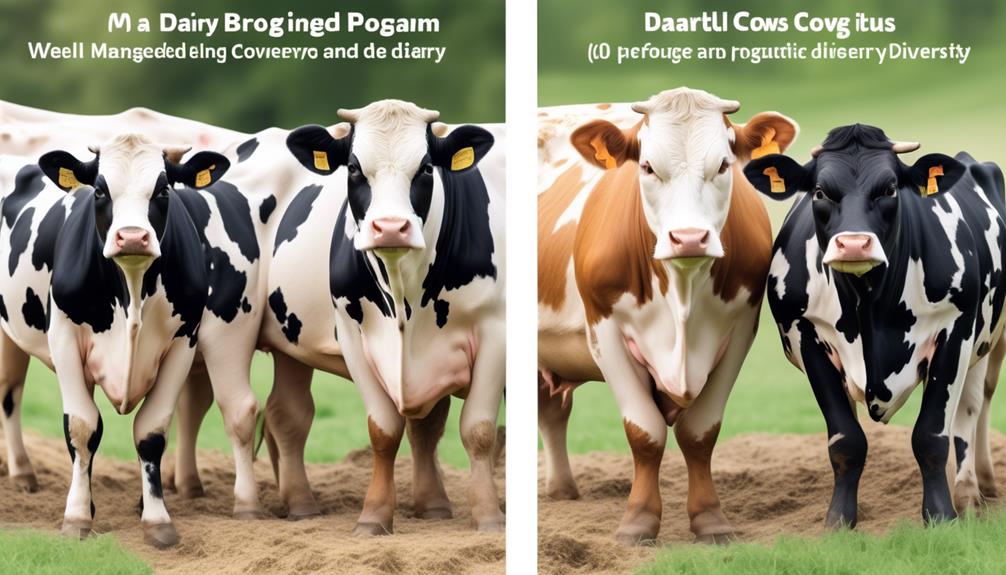
To enhance the genetic potential of your dairy herd, implementing strategic breeding programs is essential for achieving improved productivity and overall herd quality. Genetic selection plays a crucial role in breeding programs, as it allows you to choose bulls and cows with desirable traits such as high milk production, disease resistance, and strong conformation. By using advanced reproductive technologies, you can select superior genetics for your herd, ultimately leading to improved milk yields and overall profitability.
Fertility monitoring is another key component of successful breeding programs. Regularly monitoring the fertility of your cows allows you to identify any reproductive issues early on, enabling prompt intervention and management. This not only helps in maintaining optimal reproductive performance within the herd but also ensures timely breeding, leading to a more synchronized calving pattern and improved overall herd management.
Implementing a comprehensive breeding program involves utilizing tools such as artificial insemination (AI) and genomic testing to make informed breeding decisions. AI allows you to access superior genetics from around the world, increasing the genetic diversity within your herd and potentially improving overall productivity. Genomic testing, on the other hand, provides valuable insights into the genetic potential of individual animals, aiding in the selection of superior breeding stock and facilitating more accurate mating decisions.
Reproductive Technologies
Enhancing the genetic potential of your dairy herd through strategic breeding programs naturally leads to the next crucial step: embracing reproductive technologies. These technologies play a pivotal role in maximizing the reproductive efficiency of your herd, ultimately leading to improved productivity and profitability.
Here are some key reproductive technologies that can significantly benefit your dairy operation:
- Genetic Selection: Utilizing advanced reproductive technologies such as artificial insemination (AI) allows you to carefully select superior sires with desirable genetic traits. This precise method of breeding enables you to enhance the overall genetic makeup of your herd, leading to improved milk production, disease resistance, and overall herd health.
- Hormonal Synchronization: Implementing hormonal synchronization protocols can help streamline the breeding process within your dairy herd. By synchronizing the estrous cycles of your cows, you can optimize the timing of insemination, resulting in a more uniform calving season. This, in turn, facilitates more efficient management practices and maximizes the overall productivity of your operation.
- Embryo Transfer: Embracing embryo transfer technology enables you to capitalize on the genetics of your top-performing cows. By transferring embryos from elite donors to recipient cows, you can rapidly propagate superior genetics within your herd, accelerating genetic progress and ultimately improving the quality of your dairy animals.
Integrating these reproductive technologies into your management practices can significantly enhance the genetic potential and reproductive performance of your dairy herd, ultimately contributing to the long-term success of your operation.
Calving Interval Management
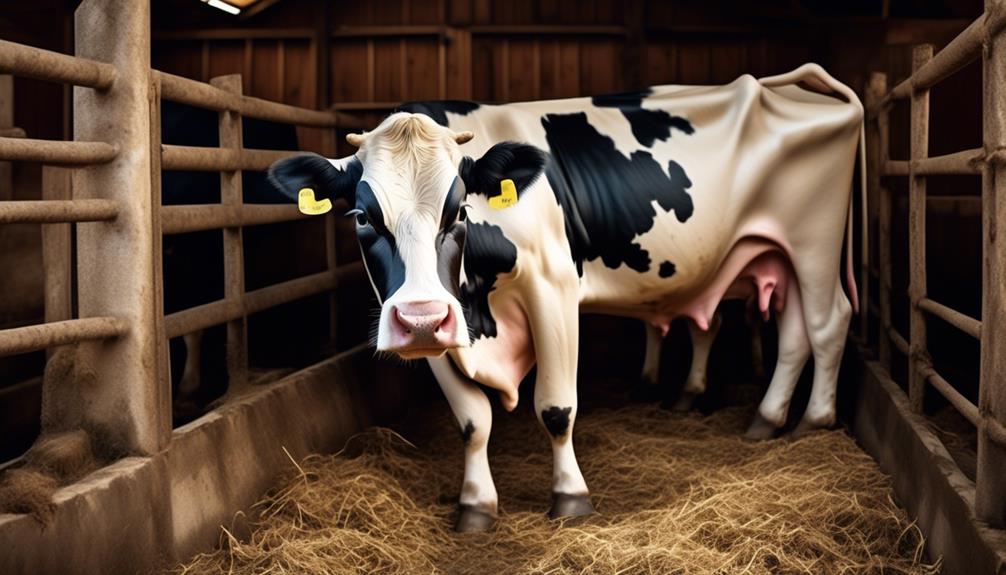
Maximizing the calving interval is essential for optimizing the reproductive performance and overall productivity of your dairy herd. Proper nutrition management post-calving plays a crucial role in ensuring that your cows are able to resume normal reproductive function in a timely manner.
After calving, it's important to provide your cows with a balanced diet that meets their energy, protein, vitamin, and mineral requirements. This will support their overall health and help them regain body condition, which is essential for successful conception and a shorter calving interval.
Additionally, hormonal regulation and estrus detection are key factors in managing the calving interval. Hormonal imbalances can disrupt estrus cycles and delay the onset of postpartum estrus, leading to longer calving intervals. Monitoring the hormonal levels of your cows and ensuring that they're within the normal range can help in early detection of any issues that may affect their reproductive health.
Moreover, accurate estrus detection is crucial for timely insemination, which is essential for maintaining an optimal calving interval.
Preventing Reproductive Disorders
After ensuring that your cows are receiving a balanced diet and their hormonal levels are in check to maintain optimal calving intervals, it's important to focus on preventing reproductive disorders for sustained herd productivity.
Preventing reproductive disorders in dairy cows is essential for maintaining overall herd health and productivity. Here are some key strategies to help prevent reproductive disorders:
- Hormonal balance: Ensuring that your cows have proper hormonal balance is crucial for preventing reproductive disorders. Hormonal imbalances can lead to irregular estrus cycles, anestrus, and other reproductive issues. Regular monitoring and management of hormonal levels can help prevent these disorders and maintain reproductive health in your herd.
- Nutrition management: Providing your cows with a well-balanced diet is vital for preventing reproductive disorders. Poor nutrition can lead to deficiencies that may impact reproductive performance. It's important to work with a nutritionist to develop and maintain a proper feeding program that meets the specific nutritional needs of your dairy cows at different stages of their reproductive cycle.
- Regular health assessments: Conducting regular health assessments and reproductive examinations can help identify and address any potential issues early on. This proactive approach can significantly reduce the risk of reproductive disorders and ensure the overall well-being of your cows.
Frequently Asked Questions
What Are the Potential Effects of Reproductive Health on the Overall Well-Being of the Dairy Cow?
Taking care of your reproductive health can greatly impact your overall well-being. Potential effects of poor reproductive health in dairy cows include decreased milk production, increased veterinary costs, and reduced profitability for your farm.
How Does the Management of Reproductive Health in Dairy Cows Impact the Sustainability of the Dairy Industry?
Managing reproductive health in dairy cows directly impacts the sustainability of the industry. Efficient breeding and calving improve productivity, reduce costs, and contribute to economic stability, ensuring the long-term success of dairy operations.
What Are Some Common Misconceptions About Reproductive Health in Dairy Cows?
Common misconceptions about reproductive health in dairy cows can affect their overall productivity. Understanding the impact of fertility management on reproductive performance is crucial for the sustainability of the dairy industry.
How Does the Environment and Housing Conditions Affect the Reproductive Health of Dairy Cows?
Maintaining good reproductive health in dairy cows is crucial. Environmental impact and housing conditions directly affect their reproductive well-being. You should ensure proper ventilation, comfortable living spaces, and stress-free environments to optimize their fertility.
What Role Do Nutrition and Feeding Practices Play in Maintaining Optimal Reproductive Health in Dairy Cows?
To maintain optimal reproductive health in dairy cows, nutrition and feeding practices play a crucial role. Proper nutrition supports fertility management, while feeding practices impact estrus detection and overall reproductive success.
Conclusion
So, as you can see, managing reproductive health in dairy cows is crucial. It directly impacts their efficiency, milk production, and overall welfare.
By implementing proper breeding programs, reproductive technologies, and calving interval management, you can prevent reproductive disorders and ensure the economic significance of your herd.
Taking care of their reproductive health is essential for the success and well-being of your dairy operation.
